第五章 Managing Across Cultures 跨文化管理 国际企业与跨文化管理课件
企业管理制度的国际化与跨文化管理
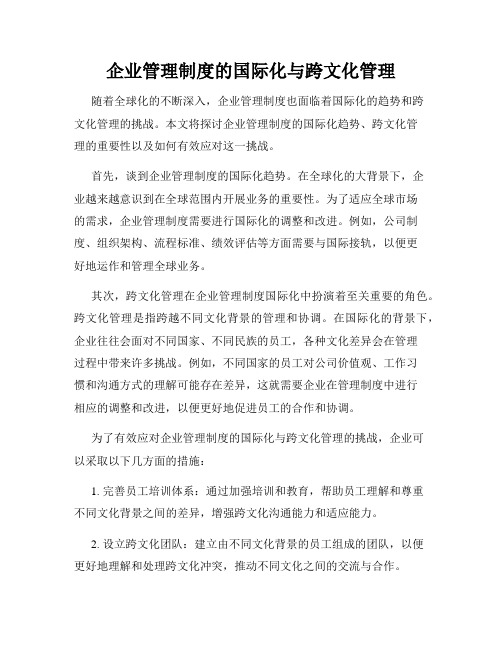
企业管理制度的国际化与跨文化管理随着全球化的不断深入,企业管理制度也面临着国际化的趋势和跨文化管理的挑战。
本文将探讨企业管理制度的国际化趋势、跨文化管理的重要性以及如何有效应对这一挑战。
首先,谈到企业管理制度的国际化趋势。
在全球化的大背景下,企业越来越意识到在全球范围内开展业务的重要性。
为了适应全球市场的需求,企业管理制度需要进行国际化的调整和改进。
例如,公司制度、组织架构、流程标准、绩效评估等方面需要与国际接轨,以便更好地运作和管理全球业务。
其次,跨文化管理在企业管理制度国际化中扮演着至关重要的角色。
跨文化管理是指跨越不同文化背景的管理和协调。
在国际化的背景下,企业往往会面对不同国家、不同民族的员工,各种文化差异会在管理过程中带来许多挑战。
例如,不同国家的员工对公司价值观、工作习惯和沟通方式的理解可能存在差异,这就需要企业在管理制度中进行相应的调整和改进,以便更好地促进员工的合作和协调。
为了有效应对企业管理制度的国际化与跨文化管理的挑战,企业可以采取以下几方面的措施:1. 完善员工培训体系:通过加强培训和教育,帮助员工理解和尊重不同文化背景之间的差异,增强跨文化沟通能力和适应能力。
2. 设立跨文化团队:建立由不同文化背景的员工组成的团队,以便更好地理解和处理跨文化冲突,推动不同文化之间的交流与合作。
3. 强调文化共识:企业可以制定明确的文化共识和价值观,以便更好地统一员工的行为准则和信念体系,实现文化的融合。
4. 开展公平公正的人力资源政策:考虑到不同文化背景的员工可能存在不同的需求和期望,企业在人力资源政策上应注重公平公正,避免对不同文化背景的员工造成不利影响。
5. 加强沟通与协调:建立有效的沟通渠道和机制,让员工能够充分表达自己的观点和意见,解决问题并取得共识。
总之,企业管理制度的国际化与跨文化管理是当前企业发展中需要重视的问题。
通过加强员工培训、设立跨文化团队、强调文化共识、制定公平公正的人力资源政策以及加强沟通与协调等措施,企业可以更好地应对并充分利用国际化带来的机遇,实现跨文化管理的成功。
国际企业人力资源的跨文化管理

国际企业人力资源的跨文化管理随着中国入世和世界经济全球化的日益加快,外国的跨国企业(MNCS在源源不断进入中国市场的同时,中国企业的国际化进程也在不断加快。
在日趋激烈的国际竞争中,无论是在东道国还是在母国,跨国公司的人力资源管理都显得尤为重要,而文化的多元化作为其显著特征,却很容易被管理者所忽略。
事实上,文化的差异或称跨文化正在挑战着跨国公司的人力资源管理。
在全球化经济的巨大挑战面前,文化在国家、公司、部门和管理者的效用中扮演着一个举足轻重的角色。
尽管在某种程度上说,文化是难以捉摸和难以把握的,但它的确可以成为一个决定或推动事业成功的重要力量。
菲亚特(Fiat )前CEO:Giovanni Agnelli 曾说过这样一段话“跨国公司组成人员的背景、文化环境、性格倾向、志向、职位等都存在着差异,而这些不同文化背景的各部门员工集聚在一起,通过他们的努力创造着一个个奇迹,才使公司的资产负债表显示的结果无论是现在还是未来都处于良好状态”。
因为今天的跨国公司可以看作多元化多种族团队,其各职能办公室由许多来自不同文化的人群组成,国际人力资源管理者已愈来愈意识到文化在国际商务中的重要作用。
不管是在国内还是在国外,理解并且管理文化的差异正成为人力资源管理工作实践中的重要部分。
毕竟,跨国公司职员的文化多元化已是不争的事实而并非对未来的预测。
正如在国际商务环境中,混合国籍并非刚刚发生,跨文化管理的研究在历史上已卓有成效,其中最具影响力和代表意义的有荷兰教授霍夫斯坦特( G. Hofstete )的跨文化研究。
他在其著作《文化的结局》( Culture 's consequences -International Differences in work related values ,1980)中提出影响管理的“文化四指标”:权力差距( Power Distance ),防止不确定性( Uncertainty Avoidance ),个人主义( Individualism ) / 集体主义( Collectivism ),男性化/ 女性化。
浅析跨国企业的跨文化管理
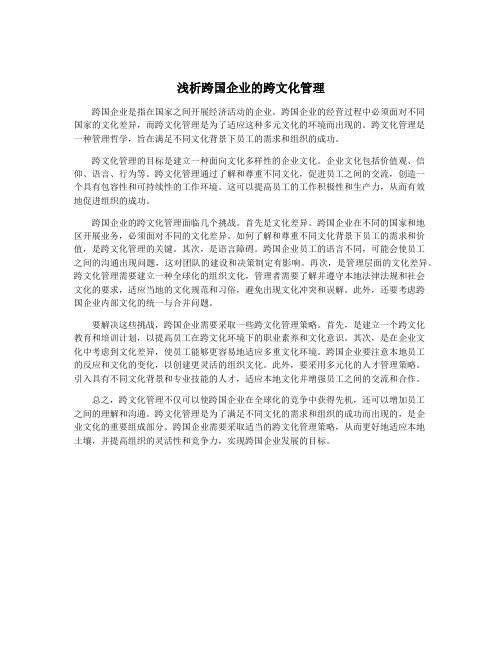
浅析跨国企业的跨文化管理跨国企业是指在国家之间开展经济活动的企业。
跨国企业的经营过程中必须面对不同国家的文化差异,而跨文化管理是为了适应这种多元文化的环境而出现的。
跨文化管理是一种管理哲学,旨在满足不同文化背景下员工的需求和组织的成功。
跨文化管理的目标是建立一种面向文化多样性的企业文化。
企业文化包括价值观、信仰、语言、行为等。
跨文化管理通过了解和尊重不同文化,促进员工之间的交流,创造一个具有包容性和可持续性的工作环境。
这可以提高员工的工作积极性和生产力,从而有效地促进组织的成功。
跨国企业的跨文化管理面临几个挑战。
首先是文化差异。
跨国企业在不同的国家和地区开展业务,必须面对不同的文化差异。
如何了解和尊重不同文化背景下员工的需求和价值,是跨文化管理的关键。
其次,是语言障碍。
跨国企业员工的语言不同,可能会使员工之间的沟通出现问题,这对团队的建设和决策制定有影响。
再次,是管理层面的文化差异。
跨文化管理需要建立一种全球化的组织文化,管理者需要了解并遵守本地法律法规和社会文化的要求,适应当地的文化规范和习俗,避免出现文化冲突和误解。
此外,还要考虑跨国企业内部文化的统一与合并问题。
要解决这些挑战,跨国企业需要采取一些跨文化管理策略。
首先,是建立一个跨文化教育和培训计划,以提高员工在跨文化环境下的职业素养和文化意识。
其次,是在企业文化中考虑到文化差异,使员工能够更容易地适应多重文化环境。
跨国企业要注意本地员工的反应和文化的变化,以创建更灵活的组织文化。
此外,要采用多元化的人才管理策略。
引入具有不同文化背景和专业技能的人才,适应本地文化并增强员工之间的交流和合作。
总之,跨文化管理不仅可以使跨国企业在全球化的竞争中获得先机,还可以增加员工之间的理解和沟通。
跨文化管理是为了满足不同文化的需求和组织的成功而出现的,是企业文化的重要组成部分。
跨国企业需要采取适当的跨文化管理策略,从而更好地适应本地土壤,并提高组织的灵活性和竞争力,实现跨国企业发展的目标。
跨国企业中的跨文化管理.doc

跨国企业中的跨文化管理一、引子不同文化之间、价值观念、思维方式、行为准则、语言、习惯和信仰都存在着明显的差异。
文化背景不同的人,其经营理念和管理方式往往大相径庭,从而导致了文化摩擦和冲突。
如果不能顺利地解决这些冲突和矛盾,跨国公司的经营和发展,必然会遇到极大的障碍,甚至导致失败。
本文作者就跨国企业在作跨国经营时,如何针对与母国文化完全不同的东道国环境,而进行不同方式的“跨文化管理”策略,提出自己的几条总结二、“文化差异”的产生和具体体现(一)文化的定义什么是文化呢?文化学的奠基人泰勒(E,D,Taylor)给文化下的定义是:所谓文化,就其广泛的民族志的意义上来说,是知识、信仰、艺术、道德、法律、风俗及任何人作为社会成员而获得的所有能力和习惯的复合的总体。
而“文化差异”是指不同国家、民族间文化的差别(二)“文化差异”的主要体现概括地说,所谓的“文化差异”主要体现在以下几个方面1.价值观的差异2.传统文化的差异3.宗教信仰的差异;4.种族优越感5.语言和沟通障碍三、如何针对不同的“文化差异”而引起的“文化冲突”,采用不同策略的跨文化管理(一)“文化冲突”是跨国企业进行跨国经营所必须面对的客观过程假如跨国公司的经营者不能适当和成功地处理好这种存在于跨国企业内部的“文化差异”就必将导致“文化冲突”。
所谓“文化冲突”是指不同形态的文化或者文化要素之间相互对立,相互排斥的过程,它既指跨国企业在他国经营时与东道国的文化观念不同而产生的冲突,又包含了在一个企业内部由于员工分属不同文化背景的国家而产生的冲突。
(二)不同的文化范畴决定了不同类型的文化冲突文化冲突与困惑源于文化差异。
文化可以分为三个范畴:正式规范、非正式规范和技术规范。
正式规范是人的基本价值观,判断是非的标准,它能抵抗来自外部企图改变它的强制力量。
因此正式规范引起的摩擦往往不易改变。
非正式规范是人们的生活习惯和风俗等,因此引起的文化摩擦可以通过较长时间的文化交流克服。
浅析跨国企业的跨文化管理

浅析跨国企业的跨文化管理跨国企业是指在多个国家开展业务的企业,而跨文化管理是指在不同文化背景下进行管理的过程。
由于不同国家和地区的文化差异,跨国企业需要进行跨文化管理来应对文化冲突和差异,以确保企业能够有效运营和发展。
跨文化管理的重要性体现在以下几个方面。
通过跨文化管理,跨国企业可以更好地适应和融入当地的文化环境,提高与当地员工、客户和合作伙伴的沟通和合作效果。
跨文化管理有助于解决文化冲突和差异,减少误解和摩擦,提高企业的工作效率和生产力。
跨文化管理还有助于提高企业的世界竞争力,拓展国际市场,实现全球化发展目标。
跨文化管理需要具备的关键要素包括文化意识、跨文化沟通、文化学习和文化适应等。
文化意识是指跨国企业的管理者要认识和理解不同文化之间的差异和冲突,以及这些差异对企业管理和运营的影响。
跨文化沟通是指在不同文化背景下进行有效沟通和交流,需要培养跨文化沟通的技巧和能力。
文化学习是指跨国企业管理者需要主动学习和了解当地的文化背景和习俗,以便更好地适应和融入当地环境。
文化适应是指在跨国企业工作的员工需要逐渐适应和融入当地的文化环境,以便更好地与当地员工和合作伙伴进行合作。
跨文化管理还需要采取一系列的管理策略和措施来应对文化差异和冲突。
跨国企业可以采取多元文化团队的方式,将来自不同文化背景的员工组织在一起,以促进文化的融合和相互学习。
跨国企业可以制定一套文化价值观和准则,以指导员工的行为和决策,从而减少文化冲突和差异产生的负面影响。
跨国企业还可以通过跨文化培训和教育来提升员工的跨文化意识和能力,帮助员工更好地理解和适应不同文化背景下的工作环境。
跨文化管理还需要持续不断地改进和优化。
由于文化是一个动态的概念,不同国家和地区的文化也在不断变化和演变。
跨国企业需要不断关注文化变化的趋势和动态,并根据需要进行相应的调整和改进,以便更好地适应和应对不同文化背景下的管理挑战。
企业国际化与跨文化管理制度

企业国际化与跨文化管理制度第一章总则第一条目的和依据为了适应企业国际化发展的需要,加强企业的跨文化管理,提升企业的竞争力和影响力,订立本制度。
第二条适用范围本制度适用于我公司全体员工及相关合作伙伴,在国际化发展和跨文化管理过程中必需遵守。
第三条定义1.企业国际化:指企业在国际市场上开展业务、参加国际竞争、拓展海外市场的行为。
2.跨文化管理:指管理者在跨越不同文化背景的员工、合作伙伴和客户之间进行沟通、协调和管理的本领和方法。
3.跨文化敏感性:指员工更好地理解和敬重不同文化,适应和应对文化差别的本领。
4.跨文化适应本领:指员工在跨文化环境下进行有效沟通、协作和决策的本领。
5.文化冲突解决:指有效处理跨文化合作中可能产生的冲突和矛盾,实现和谐共存和合作共赢的目标。
第四条原则1.敬重与宽容原则:敬重并宽容不同文化,重视员工的多元文化背景,避开鄙视和偏见。
2.平等原则:在跨文化管理中坚持平等和公正的原则,公平对待各个文化背景的员工。
3.协作与沟通原则:重视跨文化沟通与协作,促进信息沟通和共享,建立良好的跨文化团队合作氛围。
第二章跨文化管理机构和职责第五条跨文化管理部门为了有效管理企业的跨文化事务,设立跨文化管理部门。
其职责包含但不限于: 1. 订立跨文化管理政策、制度和流程。
2. 供应培训和引导,提升员工的跨文化适应本领。
3. 引导和支持各部门开展跨文化合作和沟通。
4. 帮助解决跨文化冲突和问题。
5. 监督和评估跨文化管理的实施效果。
第六条跨文化管理岗位设置为了确保跨文化管理的有效进行,各部门应设立跨文化管理岗位,岗位职责包含但不限于: 1. 帮助部门领导订立并执行相关跨文化管理政策和计划。
2. 协调部门内不同文化背景员工之间的沟通和协作,处理跨文化冲突。
3. 监测和分析国际市场及不同文化背景下员工的需求和变动。
4. 供应培训和引导,提升部门员工的跨文化意识和本领。
第七条跨文化管理委员会跨文化管理委员会由相关部门的负责人构成,重要负责: 1. 协调和推动组织层面的跨文化管理工作。
跨国公司的跨文化管理
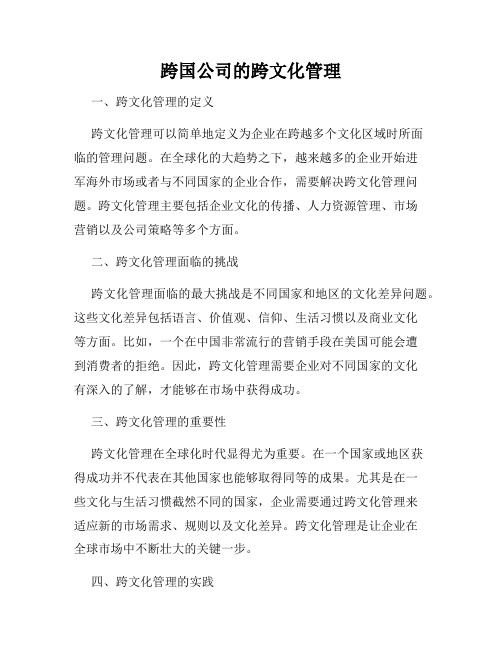
跨国公司的跨文化管理一、跨文化管理的定义跨文化管理可以简单地定义为企业在跨越多个文化区域时所面临的管理问题。
在全球化的大趋势之下,越来越多的企业开始进军海外市场或者与不同国家的企业合作,需要解决跨文化管理问题。
跨文化管理主要包括企业文化的传播、人力资源管理、市场营销以及公司策略等多个方面。
二、跨文化管理面临的挑战跨文化管理面临的最大挑战是不同国家和地区的文化差异问题。
这些文化差异包括语言、价值观、信仰、生活习惯以及商业文化等方面。
比如,一个在中国非常流行的营销手段在美国可能会遭到消费者的拒绝。
因此,跨文化管理需要企业对不同国家的文化有深入的了解,才能够在市场中获得成功。
三、跨文化管理的重要性跨文化管理在全球化时代显得尤为重要。
在一个国家或地区获得成功并不代表在其他国家也能够取得同等的成果。
尤其是在一些文化与生活习惯截然不同的国家,企业需要通过跨文化管理来适应新的市场需求、规则以及文化差异。
跨文化管理是让企业在全球市场中不断壮大的关键一步。
四、跨文化管理的实践1.文化差异的研究跨文化管理的前提是对目标市场的文化进行深入的研究,了解当地人群的生活习惯、信仰、价值观、商业文化等方面,以更好地适应和融入当地的市场环境。
2.培训和教育培训和教育是跨文化管理中非常重要的一部分。
跨文化培训可以让员工了解不同文化之间的差异,提高员工的文化敏感度和有效行动的能力。
这将有助于员工更好地理解和适应到不同的文化环境中。
3.适应和转变策略企业需要为跨文化管理制定适应和转变策略。
在不同的文化市场中,企业需要根据当地的文化习惯、需求和法规进行相应的调整,以能够更好地满足当地消费者的需求。
五、跨文化管理的益处跨文化管理可以帮助企业在全球市场中建立信任和合作关系,促进公司和其他国家之间的文化交流。
此外,跨文化管理可以为企业创造新的机会和市场,缩小文化差异,提高团队的绩效和创新能力,增强企业在全球市场中的竞争力。
六、总结跨文化管理是企业进军海外市场必备的能力。
Managing Across Cultures

Managing Across CulturesIntroductionWith the development of world economy, global economic integration has been strengthening. Business internationalization has become an irresistible tide. More and more hospitality companies carry out across-border operations. Transnational hotel enterprises are not only across-border and across-regional operated but also managed across-cultural, since they are in different cultural backgrounds and geographical environments.In the economic globalization, cultural exchange and collision, conflict and integration of values, and ethics have been accompanied by economic and social development process, so importance and urgency of cross-cultural management is obvious. Localization of foreign-invested enterprises, business globalization and internationalization phenomena are related to more complicated values and culture, and moral pluralism.Culture is a social phenomenon, and it is the national values derived from a common behavior, opposing to individual values and behavior. The essence of culture is the relative stable values shared by certain groups and nations. Culture is the total way of life of a people. It includes value, language, technology, economy and political systemand so on. The cultural value pattern may strengthen the relative importance of one of these values over the other one. ( Piotr Radkiewicz, Agnieszka Golec De Zavala, Krystyna Skarżyńsk,2008,p.227).Cultural management is a subset of culture and it is a work-related values. Hospitality industries find efficient allocation of resources and support worldwide under international economic competition and cooperation. Managing across cultures has become an issue to modern enterprise management. Studies have shown that about 35% - 45% of cross- regional operation is ended in failure, and its main reason is to neglect cultural differences on the impact of enterprise management. Thus, whether hospitality industry pays attention to managing across culture and cultural differences in order to adapt to different cultures, it plays a vital role to operate successfully the global challenges.The background of cultural managementCultural management supposes human beings as social man who attaches importance to emotion and value using in management. It means company’ values are instilled into each employee, generous space for development are provided so that subjective initiative are stimulated, enthusiasm and creativity are aroused, finally industry would achieve a leap beyond system management. It is necessary that cultural management gradually exposed while scientific management moved a decline in the late 1980s.A. the assumption of economic man was divorced from realityB. The wave of knowledge economyC. Competition was changed from productivity to serviceD. The trend of economic globalizationIn these four reasons, cultural management gradually exposed, instead of scientific management to become the forefront in management theory. As result of a pioneering investigation of Geert Hofstede (1980- 2001), now we know enough about of the characteristics that define a culture management in particular the culture in the labour set. ( F. J. Landy, J. M. Conte 2005,p.26)Managing across culturesTheoretical frameworkMore famous theories of managing across cultures are Hofstede’s Cultural Dimensions and Trompenaars’ Cultural Dimensions.A region with socio-cultural conditions similar for all professional groups, those conditions are independent of professional group. ( Willibrord Beemsterboer, Roy Stewart, Johan Groothoff, Frans Nijhuis, 2008,p.345)Hofstede’s Cultural Dimensions thought culture differences in different countries andnations are in five aspects: Power Distance Index, Individualism, Masculinity, Uncertainty Avoidance Index and Long-Term Orientation. We can draw some differences between United States and United Kingdom in accordance with his theory in table 1.Table 1 The 5D Model between in United Kingdom and United StatesPDI Power Distance IndexIDV IndividualismMAS MasculinityUAI Uncertainty Avoidance IndexLTO Long-Term OrientationResource: /Important of managing across culture for hospitalityHotel Groups continue to enhance their global business performance through international operations. Hotel Groups achieve cross-border operations, optimal allocation and expanding scale to effective expansion through delegated administration, franchise and other management methods. At the same time, transnational businesses are at different cultural backgrounds and geographical environment which produce cultural differences and cultural conflicts, so that all these have adversely affected the hotel group's market operation and established strategies.Therefore, the hotel groups must pay attention to cultural factors in cross-border operations, study cultural differences, try to avoid cultural conflict and achieve effective managing across culture. More than ever there is a need to integrate cultural environment into the global framework of economic forces.( MyriamJansen-Verbeke,2009,p.31)The impact of cultural differences on the hospitality globalizationThere are cultural differences in natural environment; education, social issues, youth, culture and sports; cooperation of administration and municipal institutions; and public order.( Joanna Zielinska, Renata Koszyk-Białobrzeska,2009,p.53). These cultural differences have several impacts.Level of market demandCulture has strong and wide implications on people's consumer demand and behavior, because most people respect their own culture, accept the values and attitudes and follow their culture, ethics and customs. These specific historical and cultural background and social values dominate consumer behavior and characteristics, and finally they are determined their demands of products.As there are cultural differences among countries, so consumers of different cultural backgrounds are different consumer needs. The needs may be tangible products, and also may be particular consumption patterns or unique consumption customs.For example, if the hotel group runs their operation and provide products and services in the Muslims countries and regions, they must pay attention to the special diet and etiquette habits and taboos. They should do appropriate adjustments to original dining products and restaurant services specifications. Otherwise, business activities would be certainly frustrated.Level of managementSenior managers within the hotel group come from all over the world. There are cultural differences among them, and there are huge cultural differences between then and local staffs in such a monomer hospitality industry. In practice, these differences are mainly different ways of thinking, behavior, customs, and cognition. Whenmanagers can not timely coordinate these differences, the cultural differences would bring a number of difficulties.First, cultural differences make staffs those who are from different cultural backgrounds have different needs and expectations, so they can increase uncertainty and complexity, and even lead to conflict and disorder. Second, cultural differences make managers from different cultural backgrounds difficult to achieve coherence, so that corporate decision-making has become more difficult. Third, cultural differences make staff from different cultures have different understanding of implementation or management, so that corporate decision-making and concerted action would become more difficult.Level of the external environmentHotel groups are impacted by external environment on the following aspects: First, different countries have different political and economic systems which result in direct impacts on business philosophy, business strategy, projects and daily operation and management. Second, different countries have different legal culture. Hotel groups must be established under the legal system and resolve a variety of commercial disputes through legal channels. The more differences in contracts, ways and means of arbitration are, the higher operating costs occur. If the anecdote strikes a resounding note on behalf of custom and tradition, a living chain of tradition” givesrise to an implied language of culture and cultural value.( Karen Lang,2009,p.260)Finally, social and cultural factors, such as language, customs and values also affect the operation and management. If they are handled carelessly, it would lead to misunderstanding of commercial activities, and even lead to failure.Cultural conflict in managing across culturesIf management problems brought by cultural differences can not be solved in time, cultural differences may be a further escalation of cultural conflict, and cultural conflict would bring even worse impact.Performances of cross-cultural conflictCommunication ConflictCommunication conflicts are mainly in communication and cultural barriers and misunderstandings. In different countries, languages and cultural backgrounds are different, and understanding of identical information will be different and even come to different conclusions. For example, when Japanese nods, it means he understands not consents. Hence, when the Americans thought that the Japanese partners agreed, while they actually rejected mildly.●Ethnocentrism ConflictSince different culture results in psychology and racial orientation differently. People from the same culture have a strong sense of racial superiority. Their biased treatment to alien culture arouses cultural conflict. For example, some hotel groups believe that their mode of operation is better than overseas competitors, therefore adopt the same operations and management abroad. They do not transform products and services to adapt special needs of specific markets. All these are conflict caused by Ethnocentrism●Management ConflictDifferent cultures cause differences in management style. In the globalization process, one management style can not be accepted by another culture, which increases effort and costs in internal management.For example, Staffs in Mexican hotels maintain a certain degree social distance to their supervisors for respect. Supervisors are not willing to empower subordinates. U.S. executives generally believe that Mexicans succumb to the authority and lack of independent-minded. These different ideas and management styles are very common in cross-cultural management.Cultural integration modelHotel Group should give to advantages of cultural differences and avoid cultural conflict, and they need effective managing across cultures, which is an important means of cultural intelligence. They should choose a suitable model of cultural integration in CQ. There are three kinds of cultural integration model. Positive aspect is that mutual open sharing of correct information and creativity help hospitality industry to find their integration potential.( Vita urbanaviciene, Arturas kaklauskas, Edmundas K.zavadskas, Mark seniut, 2009,p.270)●Culture-alternative modelAlternative-style culture means to transplant whole corporate culture of multinational enterprises to host country in the cross-border process.●Cultural innovation modelCultural innovation model means being effective cultural integration of multinational hotel groups and monomer hotels in host country through mutual understanding, adaptation and acceptance. So a new single corporate culture can be built for needs of local hotels.Localization modeLocalization mode means integration between local culture and local hotel operation and management. Hotel groups run management and operation in other countries through consultation or participation, and they give full consideration to local culture, beliefs, customs, etc. Integration takes place within that setting.( Evert van der Zweerde, 2009,p.16). They employ local staffs, develop products and services with regional characteristics and take the appropriate business strategies and operational behavior.Table 2 Cultural conflict and cultural integrationNotes:Transnational Hotel GroupsNation and region cultures①Culture-alternative②Cultural innovation③LocalizationThe degree of integrationChallenges to hospitality industry globalizationEconomic globalization would not have been such a surprise, but a new fact.(EMIL VIsnovsky,2009). It would bring potential competition and challenges to hospitality industry. A few aspects of challenges are as follows.●Increased competition on the tourist marketMultinational hotel group will use its brand, management, marketing network to expand its market share in the hotel source. They will select the most promising countries and regions as a source markets such as China and Asia, which no doubt exacerbates competition in the globalization. In addition, the international hotel groups may be related to airlines, hotels, shopping malls, restaurants join forces to implement "one-stop" services, increasing competition for market. That is good news for hospitality companies that using methods they can easier, faster, and more precisely define needs and preferences of target customer group to gain more market share.( Sebastian Kopera,2009,p.122)●Intensify competition on talentsAs the process of globalization accelerates, more hotels attract talents with high salaries and other interest-induced mechanisms, which would intensify talents competition. As hotels increasingly view the world as their market, they tend to attract and hire managers from around the world.(Baker Ayoun,Patrick J. Moreo,2008,p.25)Talent shortages would become a bottleneck restricting development of hotels. Management personnel, particularly senior managers have cultures differences and conflicts in management philosophy, concepts, ideas, system construction andmethods. These problems have never been able to effectively address. This is a challenge faced by hotel group in the process of globalization.Cultural diversityHotel operation and management of globalization is accelerating, which leads to cultural diversity. On the one hand, international associate member hotels use unified trademark, uniform equipment, unified service standards, unified financial system and unified operating rules. But On the other hand, as regional and national cultures and different backgrounds of members are apparent differences, they must maintain their cultural identity. Hotel Groups are facing a major challenge how to do a member of the joint, and while still remain the unique regional culture.Strategies and methods coping with challengesThe general trend of globalization is examined, and its impact on the field of law in general.(Charles F. Szymanski, 2009, p.20). Hotel group faces challenges of globalization mentioned above, no matter which mode they are adopt, they should recognize, respect, understanding cultural differences, then strengthen communication and carry through cultural integration, so that they could establish common and accepted corporate culture to cope with challenges and obtain success of operationand management. However, today it is a key process which is constantly changing. Here we have information about how hotel groups should do. (Vila, 2009, p.11-329).Table 3 Methods coping with challengesResearches across-cultures are a prerequisite of managing across cultures.With the accelerating process of economic globalization, more and more hospitality industries will expand the scope of cross-border operations. It would be inevitable to encounter issues of cross-cultural management. Therefore, systematic study on different cultures will help hospitality industries understand and treat the other cultures.Acording to Hofstede ’s Cultural Dimensions, Americans emphasize on individualism.Individuals in American societies may tend to form a larger number of looser relationships. The individualism is especially reflected in remuneration of senior managers. Therefore, Remuneration is root cause of conflict in the expansion from European to the U.S. In Europe, especially in France and Germany, employees do not like uncertainty. A High Uncertainty Avoidance ranking indicates the country has a low tolerance for uncertainty and ambiguity. They need to know definitely what kind of impact which internationalization and globalization of hotel groups are brought about.Through researches on managing across cultures, managers can get more information, better understand cultural differences and avoid cultural conflict and management conflictIdentify cultural differences is a key condition.Different cultural backgrounds decide that people have different values and codes of conduct. It is necessary for managers to understand employees’ different needs, different behavior patterns and different values to supervise well. That is they should analyze two or more cultures to identify cultural characteristics, reduce cultural conflicts in order to take targeted measures.For example, in some Asian countries such as China and Japan, Power and authorityis very clear. Individualism is lower than collectivism. Acording to Hofstede’s Cultural Dimensions, in cultures lower in power distance, applied to organizations, this pattern of relationship is reflected in subordinates depending on superiors for directions, embodying a paternalistic behavior that governs their relationships.( Baker Ayoun,Patrick J. Moreo.2008,P.9). Therefore, hotel operation and management should be based on centralized management in Asian countries. Wise and resolute people who dare to take responsibility are chosen to be as senior managers. However, in the United States, hotel groups can take opposite methods and strategies because American stresses individualism.In these cases, it is important that foreigners managers identify the cultural differences and to try to adapt the system to implement or try to change those cultural characteristics to block a success implementation. (M. C. Eligio Espinoza Mendez,2008.p.33)Cultural Integration is the core of managing across cultures.This cultural integration can also be considered as localization. Local hotels are more familiar with local customs, consumer preferences, market dynamics, as well as policies and regulations, so localization is essential in human resources, product innovation and marketing.When Holidays Inn and Kempinski expanded business in the Middle East, they consider Muslims habits and provide food products with the Muslim culture and characteristics, which was widely welcomed by local consumers. Localization model not only helps to reduce cost of cross-border operations overseas, but also reduce resistance of local. It is conducive to business expansion.On the other hand, cultural integration is carried out, while independence of local culture is also needed to maintain. In the last century, due to globalization, almost half of the world’s languages disappeared and half of those remaining will vani sh with the current generation. (Marijan Jost ,2009,p.302). Disempowering and raises cultural integration of maybe result in lost of values and the local culture.( Basia Nikiforova,2008,p.25)Cross-cultural communication is fundamental guarantee.Essence of cross-cultural communication is a mutual respect and understanding. Cross-cultural communication means expression of ideas between groups, transmission of information, sharing feelings between people in different cultural backgrounds into an interactive course. Establishment of multi-level, systematic, formal and informal communication is to ensure effective communication and success of cross-cultural business management. For example, one of them is intensifying individualism. The point is that globalization, which is displayed not only by the freemovement of workforce and capital, but also by intensifying interchange of cultural products, formats a person of a new type (Valdas Pruskus,2008, p.208).Constant communication can generate understanding and trust, and finally form cultural integration and innovation.●Cross-cultural management training is effective means in managing acrosscultures.●At present, some cases of failure of multinational hospitality industry shows that senior managers know less its culture and custom in sending to a country, leading irrational strategy for development and operation of the host country. For example, Stronger countries usually represent their economic achievements, so at rules, which are proposed by globalization and which would become an assumption not only for development of universal market, but also for standards of appropriate cultural behavior that would be suitable for representatives of all cultures, it is being looked at with eminently big distrust (Hofstede, G. 2001).Fact that dimensions obviously associated with culture and knowledge need stronger efforts to accept and adapt.( Mihalis kavaratzis, 2009,p.45) So, facing with globalization of hospitality industry, it will be an urgent and arduous task to do cross-cultural management training managers. And it is effective means to managingacross cultures.ConclusionEconomic globalization and international economic activity increase business market, bringing more customers, and hospitality industry will gain greater business opportunities. Challenges of globalization make competition fierce.Nowadays, convergence of management systems and practices is seen as the main result of the globalization process, which will unify not only institutional contexts in different countries, but will also lead to the convergence of national cultures.( Biljana Bogicevićc Milikic, Nebojsa Janicijevic, Mirjana Petkovic, 2008, p.76)Managing across cultures is not only the basis of hotel group globalization, but also important means to deal cultural differences and avoid cultural conflicts. The essay was written from the perspective of cultural management, usage of Hofstede's Cultural Dimensions to analyze cultural differences and conflicts. Challenges caused by globalization were also discussed: intensify competition on talents, increased competition on the tourist market and cultural diversity. Finally, more appropriate strategies and methods are put forward through analysis and understanding of cultural integration models: Researches across-cultures-- Identify cultural differences-- Cultural Integration-- Cross-cultural communication-- Cross-cultural managementIn short, multinational hotel group must take advantage of managing across cultures to avoid operational risks caused by cultural differences and conflicts. So they could promote their healthy development and implementation of global strategy.ReferencesF. J. Landy, J. M. Conte (2005), Psicología Industrial; McGraw Hill, p. 26.Baker Ayoun, Patrick J. Moreo, (2008).Does national culture affect hotel managers’ approach to business strategy? P.25M. C. Eligio Espinoza Mendez, (2008).Experiences of Mexican SME’S in the implementation of world class manufacturing.p.33.Economica and organization of enterpriseValdas Pruskus, (2008). Globalization and National Identity.p.208Vila, A. (2009). The synthesized organization. Synthesized organization.p. 11-329.Marijan Jost , (2009). Can we change stereotypes and improve the quality ofEMIL VIsnovsky, (2009).Introductory: The global potential of pragmatism p.4Vita urbanaviciene, Arturas kaklauskas, Edmundas K.zavadskas, Mark seniut, (2009). The Web-Based Real Estate Multiple Criteria Negotiation Decision Support System p.270Joanna Zielinska, Renata Koszyk-Białobrzeska, (2009), The Role of Crossborder Cooperation p.53Mihalis kavaratzis, (2009).What Can We Learn from City Marketing Practice?p.45Basia Nikiforova, (2008). Multi-cultural values and borders.p.26Evert van der Zweerde , (2009).“Plurality in Unity”: European Identity and European Citizenship .p.16Sebastian Kopera, (2009). Application of Social Software in Tourism Industry .p.122Myriam Jansen-Verbeke,(2009). The territoriality paradigm in cultural tourism.p.31Charles F. Szymanski ,(2009) ,THE GLOBALIZATION OF DISABILITY RIGHTS LAW ,p.20Karen Lang,(2009), Sir Ernst Gombrich and the baraer from Tuscany,p.260Hofstede, G. (2001). Culture’s Consequences. London: SageBiljana Bogicevićc Milikic, Nebojsa Janicijev ic, Mirjana Petkovic,(2008), HRM in Transition Economies: The Case of Serbia,p.76Piotr Radkiewicz, Agnieszka Golec De Zavala, Krystyna Skarżyńsk,(2008),Pro-social basic human values and civic involvement. The modrating role of survival vsself-expression cultural context,p.227Willibrord Beemsterboer, Roy Stewart, Johan Groothoff, Frans Nijhuis, (2008),On regional differences in sick leave: The role of work, individual and health characteristics and socio-cultural environment. p.345。
简述国际企业跨文化管理的战略
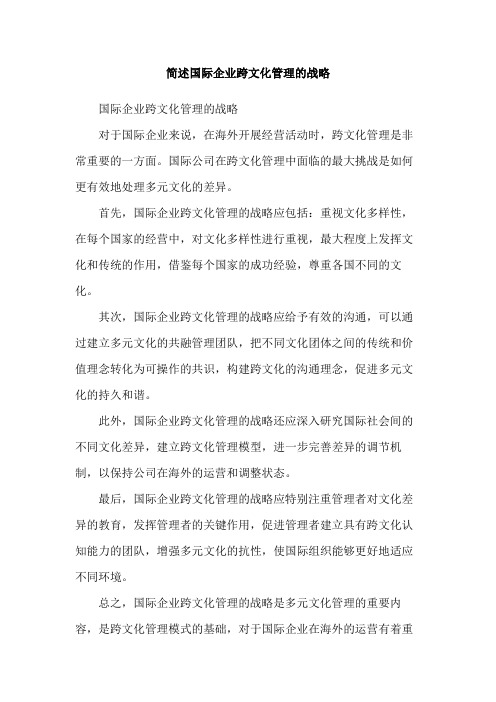
简述国际企业跨文化管理的战略
国际企业跨文化管理的战略
对于国际企业来说,在海外开展经营活动时,跨文化管理是非常重要的一方面。
国际公司在跨文化管理中面临的最大挑战是如何更有效地处理多元文化的差异。
首先,国际企业跨文化管理的战略应包括:重视文化多样性,在每个国家的经营中,对文化多样性进行重视,最大程度上发挥文化和传统的作用,借鉴每个国家的成功经验,尊重各国不同的文化。
其次,国际企业跨文化管理的战略应给予有效的沟通,可以通过建立多元文化的共融管理团队,把不同文化团体之间的传统和价值理念转化为可操作的共识,构建跨文化的沟通理念,促进多元文化的持久和谐。
此外,国际企业跨文化管理的战略还应深入研究国际社会间的不同文化差异,建立跨文化管理模型,进一步完善差异的调节机制,以保持公司在海外的运营和调整状态。
最后,国际企业跨文化管理的战略应特别注重管理者对文化差异的教育,发挥管理者的关键作用,促进管理者建立具有跨文化认知能力的团队,增强多元文化的抗性,使国际组织能够更好地适应不同环境。
总之,国际企业跨文化管理的战略是多元文化管理的重要内容,是跨文化管理模式的基础,对于国际企业在海外的运营有着重
要的意义。
浅析外资企业的跨文化管理
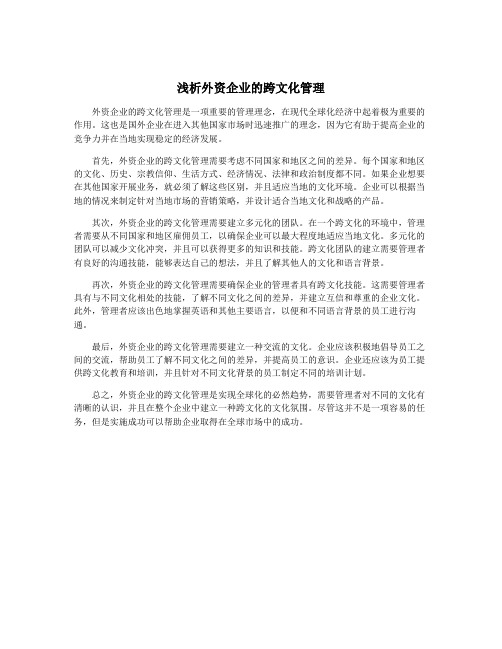
浅析外资企业的跨文化管理外资企业的跨文化管理是一项重要的管理理念,在现代全球化经济中起着极为重要的作用。
这也是国外企业在进入其他国家市场时迅速推广的理念,因为它有助于提高企业的竞争力并在当地实现稳定的经济发展。
首先,外资企业的跨文化管理需要考虑不同国家和地区之间的差异。
每个国家和地区的文化、历史、宗教信仰、生活方式、经济情况、法律和政治制度都不同。
如果企业想要在其他国家开展业务,就必须了解这些区别,并且适应当地的文化环境。
企业可以根据当地的情况来制定针对当地市场的营销策略,并设计适合当地文化和战略的产品。
其次,外资企业的跨文化管理需要建立多元化的团队。
在一个跨文化的环境中,管理者需要从不同国家和地区雇佣员工,以确保企业可以最大程度地适应当地文化。
多元化的团队可以减少文化冲突,并且可以获得更多的知识和技能。
跨文化团队的建立需要管理者有良好的沟通技能,能够表达自己的想法,并且了解其他人的文化和语言背景。
再次,外资企业的跨文化管理需要确保企业的管理者具有跨文化技能。
这需要管理者具有与不同文化相处的技能,了解不同文化之间的差异,并建立互信和尊重的企业文化。
此外,管理者应该出色地掌握英语和其他主要语言,以便和不同语言背景的员工进行沟通。
最后,外资企业的跨文化管理需要建立一种交流的文化。
企业应该积极地倡导员工之间的交流,帮助员工了解不同文化之间的差异,并提高员工的意识。
企业还应该为员工提供跨文化教育和培训,并且针对不同文化背景的员工制定不同的培训计划。
总之,外资企业的跨文化管理是实现全球化的必然趋势,需要管理者对不同的文化有清晰的认识,并且在整个企业中建立一种跨文化的文化氛围。
尽管这并不是一项容易的任务,但是实施成功可以帮助企业取得在全球市场中的成功。
跨文化管理与跨国企业管理
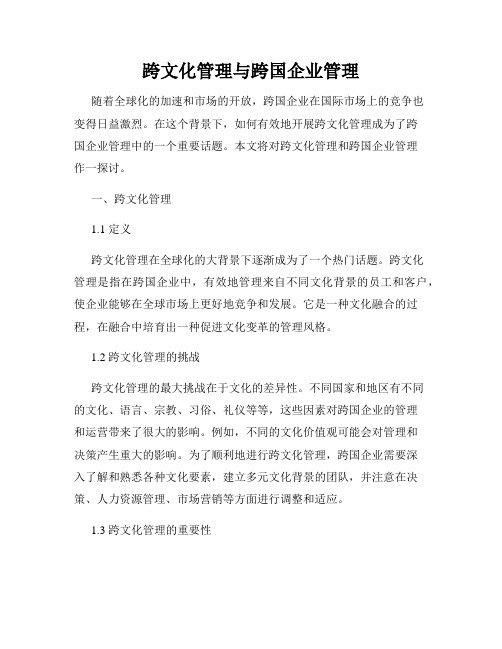
跨文化管理与跨国企业管理随着全球化的加速和市场的开放,跨国企业在国际市场上的竞争也变得日益激烈。
在这个背景下,如何有效地开展跨文化管理成为了跨国企业管理中的一个重要话题。
本文将对跨文化管理和跨国企业管理作一探讨。
一、跨文化管理1.1 定义跨文化管理在全球化的大背景下逐渐成为了一个热门话题。
跨文化管理是指在跨国企业中,有效地管理来自不同文化背景的员工和客户,使企业能够在全球市场上更好地竞争和发展。
它是一种文化融合的过程,在融合中培育出一种促进文化变革的管理风格。
1.2 跨文化管理的挑战跨文化管理的最大挑战在于文化的差异性。
不同国家和地区有不同的文化、语言、宗教、习俗、礼仪等等,这些因素对跨国企业的管理和运营带来了很大的影响。
例如,不同的文化价值观可能会对管理和决策产生重大的影响。
为了顺利地进行跨文化管理,跨国企业需要深入了解和熟悉各种文化要素,建立多元文化背景的团队,并注意在决策、人力资源管理、市场营销等方面进行调整和适应。
1.3 跨文化管理的重要性跨文化管理的重要性在于促进企业发展和成功地进入国际市场。
当企业具备了跨文化管理的能力,就可以更好地处理跨国业务、优化业务流程、提高效率和解决矛盾。
企业能够更好地了解和适应不同国家和地区的市场环境、政策法规和文化习俗,为企业发展提供更有力的支持。
二、跨国企业管理2.1 定义跨国企业管理是指跨国企业在不同国家开展业务和运营过程中所面临的管理问题。
跨国企业的管理面临着国际市场、国际竞争、不同文化和经济政策等因素的影响,因此需要有效的跨国企业管理模式来应对这些问题。
2.2 跨国企业管理的挑战跨国企业管理的最大挑战在于如何在不同国家和地区实现统一的管理和运营,包括人员组织管理、业务流程设计、财务管理、营销策略等方面。
同时,跨国企业还需要应对不同的文化和法律环境,遵守国际贸易规则,克服地域和语言的障碍,建立可持续的全球化管理战略。
2.3 跨国企业管理的重要性跨国企业管理的重要性在于促进企业的发展和提高企业的国际竞争力。
如何在跨国企业中实现跨文化管理
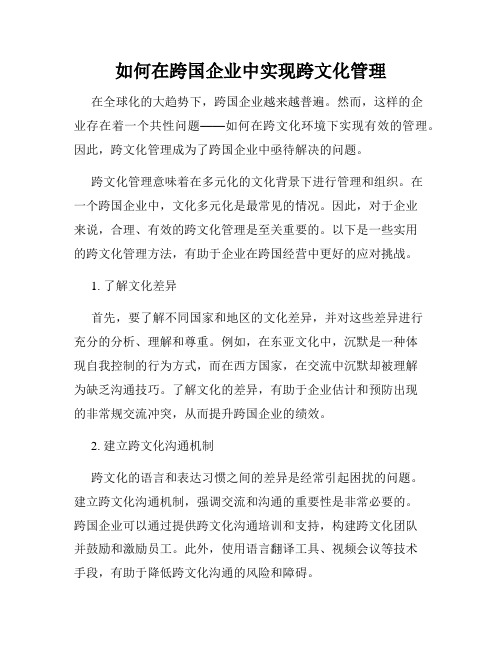
如何在跨国企业中实现跨文化管理在全球化的大趋势下,跨国企业越来越普遍。
然而,这样的企业存在着一个共性问题——如何在跨文化环境下实现有效的管理。
因此,跨文化管理成为了跨国企业中亟待解决的问题。
跨文化管理意味着在多元化的文化背景下进行管理和组织。
在一个跨国企业中,文化多元化是最常见的情况。
因此,对于企业来说,合理、有效的跨文化管理是至关重要的。
以下是一些实用的跨文化管理方法,有助于企业在跨国经营中更好的应对挑战。
1. 了解文化差异首先,要了解不同国家和地区的文化差异,并对这些差异进行充分的分析、理解和尊重。
例如,在东亚文化中,沉默是一种体现自我控制的行为方式,而在西方国家,在交流中沉默却被理解为缺乏沟通技巧。
了解文化的差异,有助于企业估计和预防出现的非常规交流冲突,从而提升跨国企业的绩效。
2. 建立跨文化沟通机制跨文化的语言和表达习惯之间的差异是经常引起困扰的问题。
建立跨文化沟通机制,强调交流和沟通的重要性是非常必要的。
跨国企业可以通过提供跨文化沟通培训和支持,构建跨文化团队并鼓励和激励员工。
此外,使用语言翻译工具、视频会议等技术手段,有助于降低跨文化沟通的风险和障碍。
3. 鼓励员工互相学习跨国企业中不同国籍的员工之间应该鼓励和促进跨文化交流。
帮助员工了解不同文化、驾驭文化差异,可以提高员工之间的互信度和工作满意度。
企业还可以将一些员工派遣到其它国家工作、学习,从而促进员工的跨文化交流和对文化的理解和尊重。
4. 建立新的文化意识跨国企业管理者应该具备一个多元化的文化宽容心态,并且能够理解特定文化的工作方式和习惯。
他们应该为员工建立一个开放和容纳多元文化的工作环境。
在这个环境中,每个人都可以表达自己,无论来自哪个文化中。
5. 引入本土管理者跨国企业中,组织管理中心往往处于总部所在地,而本地员工缺少在组织决策方面的参与。
为了解决这个问题,企业可以引入本土管理者,让他们在决策过程中发挥重要作用。
这不仅可以提高员工的参与度,也可以促进管理者和员工之间更有效的交流。
第五章 跨文化管理

迪尔和肯尼迪:组织文化的构成 要素
企业环境 价值观 英雄人物 礼节和仪式 文化网络
案例:文化比较
某男邀某女共进晚餐,席间极尽阿谀奉承 之能事。餐毕夜深人静,男子邀女子回府上 “继续探讨人生大事”,女子断然拒绝!斯情 斯景,根据男子国籍和文化背景的不同,会出 现截然不同的结局。
美国人:现实,急功近利。拿出晚餐发票: “请把餐费的一半还给我。”
回避不确定性强的国家
1)人民更忙碌、喜怒形于色、积极、活泼 2)对法律规章的情感需要可以培养人们精细、守时 的特质(瑞士、日本) 3)精细规划和组织管理正规化要求较高 回避不确定性弱的国家 1)人们更沉静、更矜持、随遇而安、怠惰 2)精细、守时不会自然成为大多数人的特质 3)能容忍各种各样的思想和形形色色的主意,利于 产生创新性思想和实践(英国有许多诺贝尔奖得主 而日本很少)
第五章
跨文化管理
本章教学内容
第一节 跨文化管理问题的提出 第二节 文化与文化差异 第三节 跨文化管理研究现状
本章重点
文化与文化差异
本章难点
霍夫斯坦特的跨文化研究
遭遇文化差异
一位秘鲁经营的美国高级主管, 被秘鲁管理人员认为是冷酷的,不值 得信任的。因为在面对面的讨论中, 他总是离的那么远。他并不知道,在 秘鲁,人们习惯于跟你谈话的人站得 很近。
霍夫斯坦特的文化维度举例
国家 个人/集体 权力差距 防止不肯定性 男性/女性
澳大利亚 加拿大 英国 法国 德国 意大利 墨西哥 新加坡 阿拉伯 美国 日本
个人的 个人的 个人的 个人的 个人的 个人的 集体的 集体的 集体的 个人的 集体的
小 中等 小 大 小 中等 大 大 大 小 大
中等 低 中等 高 中等 高 高 低 低 低 高
LeadershipAcrossCultures跨文化领导国际企业与跨文化管理

– 独裁式领导:采取以工作为中心的方式,只想完成任务的目的。
– Paternalistic: use of work-centered behavior coupled with protective employee centered concern
管理者与领导者的区别
天生拥有一
些特征 把员工带到
激励员工
新起点 对良好的工作
处理ቤተ መጻሕፍቲ ባይዱ确 表现进行认可
定事件
决定的制定者
关注效果 通过行动来
赢得尊重 建立新的标准
以未来的观点看问题
做正确的事
13-4
Leadership Foundations
• Theories X, Y and Z (philosophical background):
chapter thirteen
Leadership Across Cultures
跨文化领导
McGraw-Hill/Irwin
Copyright © 2009 by The McGraw-Hill Companies, Inc. All Rights Reserved.
Chapter Objectives
分析有效的领导实践中文化群关系和领导行为,解释为什么会有 越来越多的呼声倡导更有责任感的全球性领导行为
13-3
Leadership Foundations
学习必要的技能
关注所有员工所处的状态 站在较高的角度观察
对流程的改进进 行指导 处理复杂事物
国际企业文化与跨文化管理

国际企业文化与跨文化管理随着全球化的发展,越来越多的企业开始拓展国际市场,积极参与跨国经营。
在这个全球化的时代背景下,国际企业文化和跨文化管理变得尤为重要。
国际企业文化是指企业在不同国家和地区经营时所形成的独特文化,是企业核心价值观和行为规范的集合体。
而跨文化管理则是一种管理理念和技巧,旨在帮助企业有效地应对不同国家和地区的文化差异,实现企业的国际化发展目标。
首先,国际企业文化在跨文化管理中起到了重要的作用。
国际企业文化是企业的核心竞争力之一,它体现了企业在不同国家市场的普适性和韧性,帮助企业在国际市场上建立品牌形象和信誉。
通过国际企业文化的传承和发展,企业能够在不同的文化背景下获得更多的认同和支持,增强企业的竞争力和生存能力。
其次,跨文化管理对国际企业文化的塑造和维护起到了重要的作用。
跨文化管理需要借助有效的沟通和协调机制,通过尊重和理解不同文化之间的差异,以建立和谐、包容的工作环境。
在国际企业文化的塑造和维护过程中,跨文化管理需要注重文化的交流和融合,促进文化的氛围传播与变革。
再次,跨文化管理需要充分考虑不同文化之间的差异。
不同国家和地区的文化背景、价值观和行为习惯存在较大差异,企业在进行国际化经营时必须要对这些差异有清晰的认识并进行相应的调整。
例如,有些国家注重个人主义,而有些国家则更加强调集体主义;有些国家的工作文化强调效率和任务导向,而有些国家则更加注重人际关系和团队合作。
通过了解并尊重不同文化差异,企业能够更好地融入不同国家和地区的市场,顺利开展国际业务。
此外,跨文化管理还需要培养企业员工的跨文化意识和能力。
员工是企业的核心资源,他们的跨文化意识和能力对于企业在国际市场的竞争中起到关键作用。
企业可以通过开展培训和教育,提高员工对于不同文化之间的敏感度和理解力,培养其适应和应对跨文化环境的能力。
此外,企业在招聘和选拔员工时也需要考虑其具备的跨文化背景和能力,以确保能够在跨文化管理中发挥积极的作用。
中国企业国际化的跨文化管理(doc 4页)

中国企业国际化的跨文化管理(doc 4页)
他们的继承者将如何传承企业文化呢?他们将把握怎样的命脉呢?
第五,现在外国人认为中国已经不再是落后国,中国是很可怕的,但是中国企业还没有触及到更深层的东西。
因为中国能够真正打出去的企业很少,还没有真正触及到人权、尊严等问题。
现在我们依靠出口廉价产品,这是一个沟通的问题,但今后真正走出去的时候很多事情会变得非常现实,那时才会遇到真正的企业管理问题。
对于中国经济来讲,改革开放本身不到30年,其内部在纯经济方面的沉淀也不太多,更不用谈市场经济了。
中国最优秀的企业也不过30年的历史,其中所涉及到的文化方面的沉淀可能就更少了,尤其是走出去的文化。
而文化是一个需要一定时间积累,是绝对需要传承的东西,它需要时光的沉淀。
更多的时候,我们有的不应该是相互指责,也不应该是一种企业文化的炫耀。
在走向国际化的过程中,在进行跨文化管理时,我们还是应该冷静的思考一下中国本土文化与企业文化一脉相承的关系。
给我的第一感觉是,如果中国企业走出去打企业文化牌将会是很昂贵的,因为文化是需要人来传承的。
跨文化管理与跨国企业运营

跨文化管理与跨国企业运营跨国企业运营是指企业在不同国家开展业务活动,并需要面临与不同文化背景的员工、消费者和业务伙伴进行合作的挑战。
在这样的背景下,跨文化管理成为了一项关键的管理能力。
跨文化管理,顾名思义,就是在不同文化环境下进行管理和领导的能力。
由于不同的文化背景和价值观的存在,人们在语言表达、思维方式、决策方式、沟通风格等方面会有差异,而这些差异在跨国企业的运营中会对组织的整体效能产生直接的影响。
首先,跨文化管理需要重视文化差异。
不同的文化具有不同的价值取向和行为规范,因此,在跨国企业的管理中,需要尊重和理解不同文化的特点。
领导者应该学习并适应不同文化的沟通方式和决策模式,以便与员工和业务伙伴建立良好的关系。
其次,合理调整组织文化。
组织文化是组织内部的行为准则和价值观,它对于跨国企业的运营也具有重要影响。
为了适应不同文化背景的员工,跨国企业应该在组织层面上调整和融合不同的文化元素,创造一个既能尊重各方文化差异又能促进合作的文化氛围。
再次,重视员工培训和发展。
跨国企业面临的文化差异挑战也存在于员工之间。
为了更好地应对这些挑战,企业应该投入精力和资源进行跨文化培训和发展。
通过培训,员工可以了解不同文化的背景和行为模式,提高他们的文化敏感性,以更好地适应跨国工作环境。
此外,有效的沟通和协调也是跨文化管理的关键要素。
因为语言和文化的差异,沟通在跨国企业中变得更加复杂。
领导者应该学会倾听和理解来自不同文化背景的员工的意见和反馈,并在决策和沟通中兼顾各方的利益。
最后,建立和谐的跨国团队。
一个成功的跨国企业需要具备协作和团队合作的能力。
领导者应该鼓励员工之间的合作和团队精神,为他们提供一个互相学习和成长的平台。
同时,合理分配工作和资源,以确保团队能够顺利地合作。
在总结上述的内容之后,我们可以看出,跨文化管理对于跨国企业的运营至关重要。
它需要领导者具备全球视野和文化敏感性,并能够合理调整组织文化,重视员工培训和发展,并建立和谐的跨国团队。
跨文化管理与国际业务制度

跨文化管理与国际业务制度第一章总则第一条目的和意义为了有效开展国际业务并实现跨文化管理,提高企业的国际竞争力,保障员工权益和公司利益,订立本规章制度。
第二条适用范围本制度适用于公司全部部门和员工,包含国际业务部门、外派员工以及与国际客户有业务往来的全部员工。
第二章跨文化管理第三条跨文化意识1.公司要求员工具备跨文化意识,敬重和理解不同文化背景的员工和客户。
2.公司将定期开展跨文化培训,提高员工的跨文化意识和沟通本领。
第四条语言本领1.员工应具备良好的语言本领,能够娴熟运用英语及其他必需的外语。
2.公司鼓舞员工参加语言培训和供应必需的语言学习资源。
第五条文化差别管理1.在国际业务往来中,员工应重视和处理文化差别,遵从本地礼仪和文化准则,以避开误会和冲突。
2.公司鼓舞员工了解和学习目标国家的文化,提高文化适应本领。
第六条团队协作1.公司鼓舞跨文化团队合作,促进不同国家、地区和文化背景的员工之间的沟通与合作。
2.对于跨文化团队,应充分敬重不同文化的观点和看法,通过有效沟通解决问题。
第三章国际业务制度第七条国际市场开拓1.公司将订立国际市场开拓计划,并依据不同市场的特点、文化差别等订立相应的策略。
2.外派员工应具备国际市场开拓本领,熟识目标市场的经济、文化、法律等情况。
第八条跨国合作与合作伙伴选择1.公司将乐观开展跨国合作,并选择合适的合作伙伴。
合作伙伴选择应考虑其专业本领、声誉和文化适应本领。
2.签订合作协议前,应进行尽职调查,并明确合作的目标和责任分工。
第九条国际业务资源管理1.公司将合理调配和管理国际业务所需的资源,并订立相应的资源规划和管理流程。
2.公司对国际业务资源的使用进行监督和评估,确保资源的合理利用和优化配置。
第十条国际业务风险管理1.公司将建立国际业务风险管理制度,包含但不限于市场风险、政治风险、汇率风险等。
2.员工应及时报告和应对国际业务可能存在的风险,并寻求上级和相关部门的支持和引导。
第五章 Managing Across Cultures 跨文化管理 国际企业与跨文化管理课件

5-6
Strategic Predispositions 战略倾向
• Geocentric predisposition 全球中心倾向
– A philosophy of management whereby the company tries to integrate a global systems approach to decision making.
了解子公司的优势和劣势,从而提供必要的帮助以适应当地的需求
– Give subsidiary more autonomy; let it respond to changes in local demand
给予子公司更多的自主权以使它能够更好的对当地需求的变化做出反 应
5-11
Cross-Cultural Differences and Similarities
民族性响应?advertisingforexamplefrench法国人?avoidreasoningorlogic避免理性和逻辑性?advertisingpredominantlyemotionaldramaticsymbolic广告大多都是感情丰富富于戏剧性和象征性的?spotsviewedasculturaleventsartforsakeofmoneyandreviewedasiftheywereliteraturesorfilms现场广告被看做是文化活动为了钱的艺术而且像电影或戏剧一样进行回顾british英国人?valuelaughteraboveallelse最注重幽默?typicalbroadselfdeprecatingbritishcommercialamusesbymockingbothadvertiserandconsumer典型的英国报纸或自唱反调的商业片都以嘲弄广告商和顾客来取乐germans德国人?wantfactualandrationaladvertising?typicalgermanspotfeaturesstandardfamilyof2parentstwochildrenandgrandmother典型的德国现场广告迎合有双亲两个孩子和祖母的普通家庭以广告为例
- 1、下载文档前请自行甄别文档内容的完整性,平台不提供额外的编辑、内容补充、找答案等附加服务。
- 2、"仅部分预览"的文档,不可在线预览部分如存在完整性等问题,可反馈申请退款(可完整预览的文档不适用该条件!)。
- 3、如文档侵犯您的权益,请联系客服反馈,我们会尽快为您处理(人工客服工作时间:9:00-18:30)。
Strategic Predispositions 战略倾向
Four distinct predispositions toward doing things in a particular way: 以特定方式行事的四种不同倾向: 1. Ethnocentric 母国中心倾向 2. Polycentric 多元中心倾向 3. Regio-centric 地区中心倾向 4. Geocentric 全球中心倾向
– 一种以母国的价值观和兴趣来指导战略决策的国家 主义的管理哲学。
5-4
Strategic Predispositions 战略倾向
• Polycentric predisposition 多元中心倾向
– A philosophy of management whereby strategic decisions are tailored to suit the cultures of the countries where the MNC operates.
– 一种试图整合一个全球体系来进行决策的管理哲学。
5-7
Orientation of an MNC 跨国公司的战略倾向
5-8
Meeting the Challenge 迎接挑战
• The Globalization Imperative: • 全球化规则:
– Belief that one worldwide approach to doing business is key to efficiency and effectiveness. 深信用一种通用方法在世界范围内做生意是取得效率和效果的关键。
5-3
Strategic Predispositions 战略倾向
• Ethnocentric predisposition 母国中心倾向
– A nationalistic philosophy of management whereby the values and interests of the parent company guide strategic decisions.
5-9
Globalization vs.
National Responsiveness 全球化VS.民族性响应
– 一种将企业自身兴趣与子公司的兴趣在地区基础上整合起来的 管理哲学。
5-6
Strategic Predispositions 战略倾向
• Geocentric predisposition 全球中心倾向
– A philosophy of management whereby the company tries to integrate a global systems approach to decision making.
chapter five 第五章
Managing Across Cultures 跨文化管理
McGraw-Hill/Irwin
Copyright © 2009 by The McGraw-Hill Companies, Inc. All Rights Reserved.
Chapter Objectives 本章目标
2. DISCUSS cross-cultural differences and similarities. 讨论文化间的差异性和相似性
3. REVIEW cultural differences in select countries and regions, and note some of the important strategic guidelines for doing business in each. 回顾一些特定国家和地区的文化差异,并注意在每个国家做生意时的一 些重要的战略指导方针。
The specific objectives of this chapter are: 本章的具体目标是:
1. EXAMINE the strategic dispositions that characterize responses to different cultures. 考察全球化和民族性响应对国际战略管理的影响
– Many factors facilitate the need to develop unique strategies for different cultures: 绝大多数跨国公司在其附属子公司都沿用相同的战略来对应不同的文化: • Diversity of worldwide industry standards 世界范围内产业标准的多样化 • Continual demand by local customers for di品差异化的要求越来越高 • Importance of being insider as in case of customer who prefers to “buy local” 成为本地产品的重要性是因为消费者偏爱购买当地产品 • Difficulty of managing global organizations 管理跨国公司的难度 • Need to allow subsidiaries to use own abilities and talents unconstrained by headquarters 允许子公司运用自身的能力和才智而不受制于总部的要求
– 一种定制战略决策以适应跨国公司运作所在国家文化的管理哲 学。
5-5
Strategic Predispositions 战略倾向
• Regio-centric predisposition 地区中心倾向
– A philosophy of management whereby the firm tries to blend its own interests with those of its subsidiaries on a regional basis.
